You’re in store for another edition of Bibliophile Fridays. This week is extra special for me because I came up with the topic. In honor of Teacher Appreciation Week I thought we could talk about 5 books we were supposed to read in school and did/never did. I have read, what feels like, my entire life. Majoring in English Lit for my Bacherlors and Masters has resulted in me reading TONS of books. I mean tons. So I thought I would like to do a post of books I NEVER read in school. So read along. You might be surprised. (By the way, I lot of these I forgot I missed out on until I was reading the Rory Gilmore Reading List – my score on the list is coming to a blog near you soon! keep an eye out)
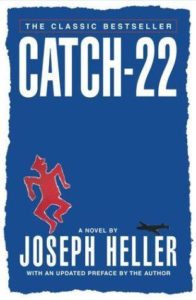 Catch 22 by Joseph Heller
Catch 22 by Joseph Heller
This one makes me somewhat sad since I use the expression, but never read it. It feels wrong. Like I’m paying homage to something I don’t know, which is actually 100% correct. Actually a lot of people in my school read it, but for a different class. We had advanced English and normal English and they had different reading lists. This is actually the reason a lot of the books I have today are here.
Goodreads says it’s about, but you might know already:
His problem is Colonel Cathcart, who keeps raising the number of missions the men must fly to complete their service. Yet if Yossarian makes any attempts to excuse himself from the perilous missions that he’s committed to flying, he’s trapped by the Great Loyalty Oath Crusade, the bureaucratic rule from which the book takes its title: a man is considered insane if he willingly continues to fly dangerous combat missions, but if he makes the necessary formal request to be relieved of such missions, the very act of making the request proves that he’s sane and therefore, ineligible to be relieved.
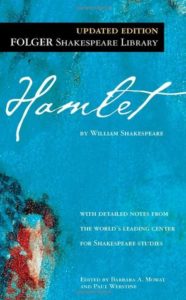 Hamlet by William Shakespeare
Hamlet by William Shakespeare
This is a classic. And yet I never read it in school. I know this has to be on the curriculum, but for some reason it never was on ours. So you might ask, if you didn’t read this classic, then what did you read! Well I read, Othello, The Tempest, King Lear, Julius Caesar, As You Like It, The Taming of the Shrew, Twelfth Night, Midsummer’s Night Dream, Romeo and Juliet, and tons of other plays not by Shakespeare. But no Hamlet. I guess my one chance was in elementary school when we each got a play, of three schools, and had to perform an abridged version. We got Romeo and Juliet though. Wanna know what part I got? The Prologue Player. And I had to share that role, so I didn’t even do the whole thing.
If you didn’t know, Hamlet is about, according to Goodreads:
One of the greatest plays of all time, the compelling tragedy of the tormented young prince of Denmark continues to capture the imaginations of modern audiences worldwide. Confronted with evidence that his uncle murdered his father, and with his mother’s infidelity, Hamlet must find a means of reconciling his longing for oblivion with his duty as avenger. The ghost, Hamlet’s feigned madness, Ophelia’s death and burial, the play within a play, the “closet scene” in which Hamlet accuses his mother of complicity in murder, and breathtaking swordplay are just some of the elements that make Hamlet an enduring masterpiece of the theater
Actually I had another chance when I was in college and doing tragedies, but they decided not to read it because “everyone had already” so we read things like the Dutchess of Malfi, and Faustus.
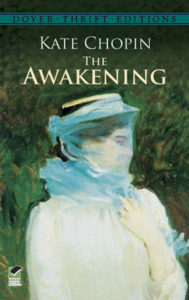 The Awakening by Kate Chopin
The Awakening by Kate Chopin
One summer in high school we were given the choice of a book to read. The book choices where: The Awakening by Kate Chopin and The Metamorphosis by Franz Kafka. I chose the Metamorphosis (and that was just what I needed at the time as it has been pretty transformative for my lit. career so far) but it meant I missed out. And all my friends chose the other. So I just didn’t miss the story, but also my ticket to the cool kids club.
Goodreads summarizes it:
The Awakening shocked readers with its honest treatment of female marital infidelity. Audiences accustomed to the pieties of late Victorian romantic fiction were taken aback by Chopin’s daring portrayal of a woman trapped in a stifling marriage, who seeks and finds passionate physical love outside the confines of her domestic situation.
Doesn’t that sound peachy?
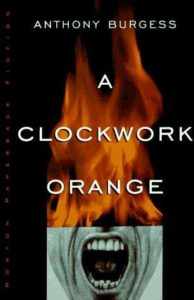 A Clockwork Orange by Anthony Burgess
A Clockwork Orange by Anthony Burgess
So I’ve never read this, but I have seen the movie (which made my enjoyment of Singin’ in the Rain strained). We were asked if we were allowed to read this, but we needed our parent’s permission. Mine said no (if I can recall or maybe it was needed for the movie? I don’t remember well). I actually am going to read this, along with the other’s on my list, but this one seems the most my style.
Goodreads summarizes it:
In Anthony Burgess’s nightmare vision of the future, where criminals take over after dark, the story is told by the central character, Alex, who talks in a brutal invented slang that brilliantly renders his and his friends’ social pathology. A Clockwork Orange is a frightening fable about good and evil, and the meaning of human freedom. When the state undertakes to reform Alex—to “redeem” him—the novel asks, “At what cost?”
Oh dystopias.
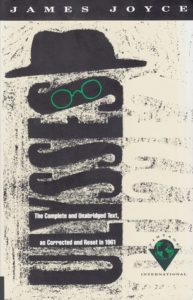 Ulysses by James Joyce
Ulysses by James Joyce
Look, I tried to read this! It was an optional reading for my class in my Masters, on eating culture (best class of the whole program). We had to read a few chapters, and I thought, ‘this would be a great way to read the whole thing’. But it is a giant! A mammoth of a book and something I’ve actually, now that I think about it, been given two chances to read. During my Bachelors, my friend wanted to do a read along. I said yes, checked the book out and then told them actually I had to study. Now that I know more about it, literature-wise, the desire is there, but now absolutely no time. Maybe in my retirement?
Goodreads says:
William Blake saw the universe in a grain of sand. Joyce saw it in Dublin, Ireland, on June 16, 1904, a day distinguished by its utter normality. Two characters, Stephen Dedalus and Leopold Bloom, go about their separate business, crossing paths with a gallery of indelible Dubliners. We watch them teach, eat, stroll the streets, argue, and (in Bloom’s case) masturbate. And thanks to the book’s stream-of-consciousness technique–which suggests no mere stream but an impossibly deep, swift-running river–we’re privy to their thoughts, emotions, and memories. The result? Almost every variety of human experience is crammed into the accordian folds of a single day, which makes Ulysses not just an experimental work but the very last word in realism.
Discussion
What books did you (not) read from school?
Subscribe for more fun posts like this
If you liked this post, you might like my last Bibliophile Fridays post on Covers.